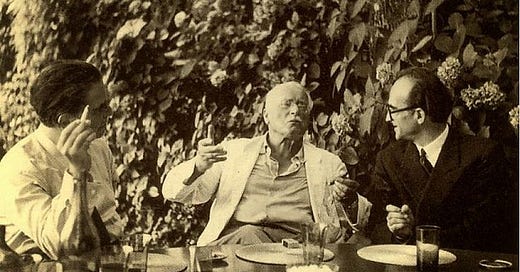Mundus Imaginalis or the imaginary and the imaginal
HENRY CORBIN (Paris/Teheran) from Spring 1972 - Zürich
[This paper, delivered at the Colloquium on Symbolism in Paris in June 1964, appeared in the Cahiers internationaux de symbolisme 6, Brussels 1964, pp. 3-26. The version printed here has been condensed (with the permission of the author) by omitting paragraphs of a technical nature on pages 5 and 8 of the original, as well as an account (pp. 17-23) of the topography of the Eighth Clime. The complete text of this account has been published in H. Corbin, En Islam iranien: aspects spirituels et philosophiques, tome IV, livre 7, Paris: Gallimard, 1971. Other writings of Prof. Corbin have been published regularly in French in the Eranos Jahrbiicher. His major works in English translation are: Avicenna and the Visionary Recital (Bollingen Series LXVI) N. Y. and London, 1960 and Creative Imagination in the Sufism of Ibn'Arabi, Princeton and London, 1969. – Eds.]
My intention in proposing the two Latin words mundus imaginalis as a title for this paper was to circumscribe a very precise order of reality, which corresponds to a precise mode of perception. Latin terminology has the advantage of providing us with a fixed and technical point of reference against which we can compare and measure the various, more or less vague equivalents suggested by modern Western languages.
To begin with, I shall make a confession. The choice of the two words had begun to become inevitable for me some time ago, because I found it impossible to content myself with the word imaginary for what I had to translate or to describe. This is by no means intended as a criticism of those whom language usage compels to have recourse to this word, since all of us are trying merely to revalue it in the positive sense. However, despite all our efforts, we cannot prevent that, in current and non-premeditated usage, the term imaginary is equated with the unreal, with something that is outside the framework of being and existing, in brief, with something Utopian. The reason why I absolutely had to find another expression was that, for a good many years, my calling and my profession required me to interpret Arabic and Persian texts, whose meaning I would undoubtedly have betrayed had I simply contented myself — even by taking all due precaution — with the term imaginary. I had to find a new expression to avoid misleading the Western reader, who, on the contrary, has to be roused from his old engrained way of thinking in order to awaken him to another order of things.




